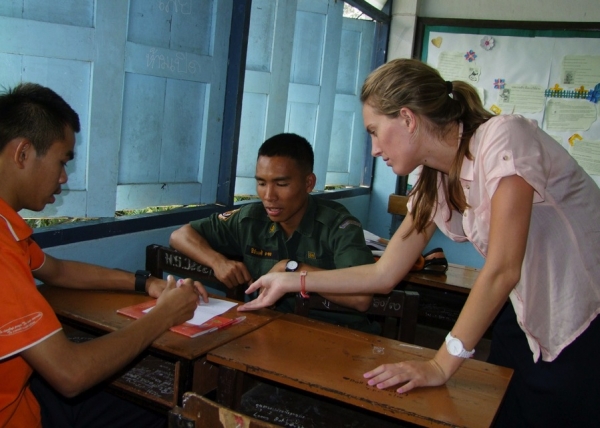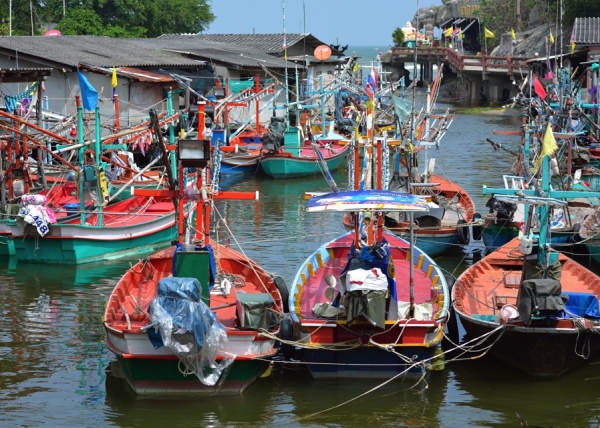Don't miss out on the best jobs!
Subscribe to HelpGoAbroad and weekly we will sent you an email with latest job posts. Provide your email address below
The Kingdom of Thailand, one of the most popular tourist destinations in the world, has many English teaching positions available. If you are interested in experiencing a lively culture in a tropical climate with tasty cuisine and stunning scenery, teaching abroad in Thailand is right for you.
Imagine instructing a classroom full of eager, energetic students during the week, and then off to experience the incredible nightlife in Bangkok over the weekend. Picture yourself helping a community in need, and then on a beach during school breaks and national holidays.
CULTURAL TIPS AND TABOOS
Thailand is known as the “Land of Smiles” for a reason. Thai people are very warm and welcoming, but first impressions matter and appearance says it all.
Tip: Pay attention to your personal hygiene, and dress appropriately for school.
Long hair for men should be clean and kept. Facial hair should be groomed. Wear long pants, collared shirts, and closed-toed shoes. A tie impresses, but is not always necessary.
Women should cover shoulders and cleavage. Wear collared shirts or blouses with long skirts, or dresses covering the knees. Shy away from sandals and unnecessarily high heels.
Taboo: Dressing inappropriately leaves a very negative impression.
Unsuitable attire might lead to job loss, lack of respect, and/or not being asked to renew a contract.
Tip: Thai people often speak indirectly, and tend to answer questions in a positive way, even if they actually disagree or mean the opposite. Read nonverbal gestures and cues to get the gist.
Taboo: It is considered taboo for women to touch monks in Thailand.
THAI LANGUAGE
Politeness is very important in Thailand. Words such as “khap” used by men, and “kah” used by women are commonly placed at the end of sentences in the same way English speakers would use sir or madam to show respect. For example:
Hello (male): sa-wat-dee-khap
Hello (female): sa-wat-dee-kah
Thank you (male): kawp-khun-khap
Thank you (female): kawp-khun-kah
The language of Thai is tonal. Trying to learn Thai without hearing it, is difficult.
HOW TO GET A TEACHING JOB IN THAILAND
Requirements:
- Native English-speaker
- Bachelor’s degree and/or TESOL/TEFL certificate
Salaries for English teachers in Thailand are relatively high compared to cost of living. Expect to get paid approximately $800-$1,000 USD (30,000 baht) depending on location and qualifications. Degree holders are preferred, and TESOL/TEFL certification is recommended.
School semesters in Thailand are roughly May to September, and November to March with breaks in between. Contracts are offered per term or year. Dates to apply vary, and applications are generally accepted on a rolling basis.
There are many companies advertising teaching positions in Thailand. A service provider such as Greenheart Travel offers a placement package of $1,500 (not including travel expenses), or $2,300 for placement and a 120-hour TESOL course through XploreAsia, an organization based in Thailand.
Going through Greenheart Travel and XploreAsia includes: pre-departure assistance, airport pickup and transfer in Bangkok, one week of orientation upon arrival (three additional weeks of TESOL training optional), accommodation during orientation and training, contract negotiation, collaboration with agencies and schools, in-country support, and medical/accident insurance.
Although it seems best to go through established companies to teach in Thailand, the cost steers some would-be GETs away. Most schools in Thailand use agents to find and manage teachers. Research if a particular agent is trustworthy before venturing out on your own. Some agencies are knowledgeable and professional. Others are not.
WHERE TEACHERS ARE PLACED
Thailand is made up many provinces. Each province has a capital city, and most teachers located outside of Bangkok are hired at schools in these cities. GETs not placed in provincial capitals have more rural living conditions. Pay slightly differs in each area.
Teaching positions are available in private and public primary and secondary schools throughout Thailand, in addition to some preschools/kindergartens and colleges/universities.
IN THE CLASSROOM
You might be expected to teach from day one at your school, and likely on your own. Having prior experience, a degree in teaching, or a TESOL/TEFL certificate certainly helps. Anticipate teaching 18-25 hours per week.
As the native English-speaker, your primary focus would be to instruct speaking and listening skills. Class sizes tend to be large in public schools, which means classes may well be challenging to manage. Prepare to teach mostly low-level learners.
You might need to make your own curriculum with or without course books. Use of technology in the classroom is more common around Bangkok, and/or in private institutions. You could also be responsible for creating exams and reporting students’ scores.
OUT OF THE CLASSROOM
Being a teacher in Thailand is a big deal. Teachers are highly respected in Thai society. GETs should take pride in their position, maintain a professional demeanor in and out of school (especially in small, rural towns), and be wiling to participate in some school activities outside of working hours.
LIVING EXPENSES, ACCOMODATION AND CONDITIONS
Do not expect to have the same living conditions as what you might be used to. Most often, teachers live in very basic housing near a school. Rent in Bangkok largely ranges from $200-$350 USD per month. Apartments might come fully furnished. Utilities are not typically included, and a down payment might be required.
Prices for housing and costs of living vary based on region. Bigger cities have more options to pick and choose from. Small communities do not. Rent in Chaing Mai, northern Thailand, is normally cheaper than Bangkok. Rent around Phuket in southern Thailand can be slightly higher than other areas, but generally not as expensive as Bangkok.
Internet connection in Thailand is decent in most areas. SIM cards are either free, or come with a prepaid, inexpensive plan. Cheap phones can also be purchased if your phone cannot be unlocked.
Thailand is quite safe. Use common sense in touristy hotspots.
VISA REQUIREMENTS
Foreigners need a non-immigrant (type B) visa to work in Thailand. It is usually valid for three months. Schools have to apply for a Thai work permit for GETs, and a non-immigrant (type B) visa must be obtained before a permit can be issued for teachers to legally work in Thailand.
If you are unable to get a non-immigrant (type B) visa before arrival, apply for a 30-day tourist visa to enter the country, and then get a non-immigrant (B) visa soon after arriving.
“Visa runs” are a necessary part of teaching English in Thailand since most contracts last longer than the duration of a visa. Many GETs travel to Laos or Malaysia for a short excursion to renew their visa.
WHY YOU SHOULD TEACH ENGLISH IN THAILAND
The difference between each region of Thailand is significant. Like most adventures in life, comparing your journey with others who have gone before you, or those you meet along the way would only lead to inaccurate assumptions. Be open and flexible, do not come with too many expectations, and you will have a fantastic, unforgettable time.
Where else could you hike through jungle, volunteer at an elephant sanctuary, discover ancient ruins, and soak up a culture full of history while making a difference in the lives of students? Teach abroad in Thailand.
Sign in to publish a comment





Be the first to comment on this post.